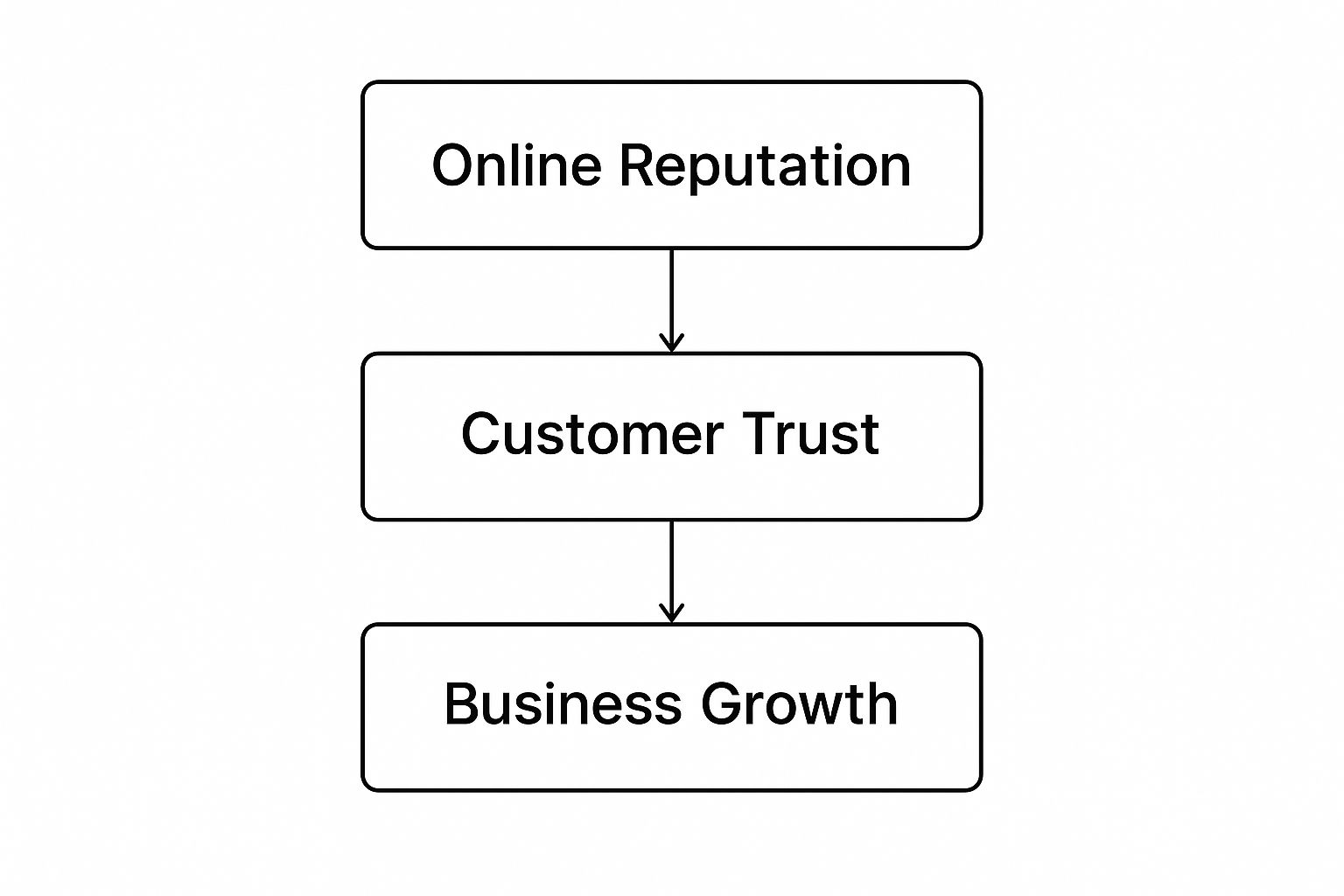Let’s get straight to it: why is online reputation so important? Think of it as your digital handshake—it’s the very first impression a potential customer has of your business, long before they ever pick up the phone or walk through your door. A great online presence builds instant trust, directly shapes buying decisions, and lays the foundation for real, sustainable growth.
Your Digital Handshake: Why Online Reputation Matters
In today’s world, what customers find online is their reality. Your online reputation is the sum total of what people see and say about you across the web—from reviews and social media comments to search engine results and local news mentions. It’s the story people tell about you when you’re not in the room.
Picture a customer searching for a local service. They see two options. One has a 4.8-star rating with dozens of glowing reviews. The other has a 3.2-star rating with a few complaints sprinkled in. Which one do you think they’ll choose? It’s an almost instantaneous decision, and it perfectly illustrates the power of your digital reputation in action.
The Foundation of Customer Trust
Trust is the currency of business today, and a solid online reputation is how you earn it at scale. People put an incredible amount of faith in what other customers have to say, treating online reviews as if they were personal recommendations from a trusted friend.
A strong online reputation isn’t just a nice marketing goal; it’s a fundamental business asset. It acts as powerful social proof, reassuring potential customers that choosing you is a safe, smart decision. That trust translates directly into more customers and greater loyalty.
The numbers don’t lie. Studies consistently show that 85% of consumers trust online reviews as much as recommendations from friends or family. What’s more, a staggering 92% of users will only consider a business if it has at least a 4-star rating. This just goes to show how high consumer standards are, making a proactive approach to your reputation absolutely essential. You can dive deeper into these online reputation management statistics to see the full picture.
The Four Pillars of a Strong Reputation
A healthy online reputation isn’t built on just one thing. It’s a combination of several key factors that work together to create a trustworthy and appealing brand image. When you manage these pillars effectively, you’re not just collecting stars; you’re building a resilient business.
Here’s a quick look at the core components:
The Four Pillars of Online Reputation at a Glance
| Pillar | What It Is | Why It Matters |
|---|---|---|
| Reviews | Customer feedback on platforms like Google, Yelp, and industry-specific sites. | This is the most direct form of social proof. High ratings and positive comments build immediate trust. |
| Social Media Presence | How your business appears and interacts on platforms like Facebook, Instagram, and LinkedIn. | It showcases your brand’s personality and allows for direct engagement, turning customers into a community. |
| Search Engine Results | What appears on the first page of Google when someone searches for your business. | High rankings and positive search snippets position you as an authority and increase visibility. |
| Responsiveness | How quickly and professionally you reply to reviews, comments, and messages (both good and bad). | It shows you care about customer feedback and are committed to service, which can turn a negative into a positive. |
Thinking about your reputation through these four pillars helps you see that it’s an active, ongoing process. Managing it well is what separates thriving businesses from the ones that get left behind.
The diagram below clearly shows how a strong reputation is the engine for building the customer trust necessary for growth.

As you can see, reputation is the starting point. It feeds directly into how trustworthy customers perceive you to be, which is what ultimately drives growth. If you neglect your online presence, you’re cutting off this critical flow before it even has a chance to start.
How Reviews and Trust Shape Customer Decisions

Ever wonder why a 4.5-star rating feels worlds apart from a 3.8? It’s all about the psychology of trust. Online reviews have become the modern-day equivalent of a friend’s recommendation, acting as a powerful signal that helps customers feel confident about where they spend their money.
When someone lands on your page and sees a high star rating, it’s a mental shortcut. Their brain quickly processes it as a sign of quality and safety, essentially saying, “Lots of people tried this and had a great experience.” That simple reassurance can be the nudge they need to take the next step, as it dramatically lowers the perceived risk of a bad purchase.
Of course, the star rating is just the beginning of the story. Savvy customers always dig deeper. They comb through the written comments to understand the “why” behind the numbers, searching for details that speak directly to their own needs and potential worries.
The Power of Social Proof
In simple terms, social proof is our natural human tendency to follow the crowd. We assume that if many people are doing something, it must be the right thing to do. In the business world, nothing provides stronger social proof than a steady stream of authentic customer reviews. Each positive comment validates a potential customer’s choice before they even pull out their wallet.
Your online reputation isn’t just a marketing nice-to-have; it’s a core business asset. Think about this: 88% of consumers trust online reviews as much as a personal recommendation from a friend or family member. That statistic alone shows just how deeply your digital reputation is tied to real-world results.
This is what makes your online reputation the bedrock of customer trust. Every positive review is a mini-testimonial, and together they build an overwhelmingly persuasive case for your brand. For a local company, a stellar review profile is often the single most important advantage when competing against a larger, more established player. We cover more on how to build a strong online presence for your small business in our complete guide.
Why Responding to Reviews Is Non-Negotiable
Ignoring your reviews—whether they’re glowing or critical—is like turning your back on a customer talking right to your face. It’s a missed opportunity. Actively engaging with feedback is absolutely essential for managing your reputation.
- Responding to Positive Reviews: A simple “thank you” goes a long way. It reinforces the customer’s great experience, shows you appreciate their business, and builds the kind of loyalty that creates repeat customers.
- Responding to Negative Reviews: This is your chance to shine. Addressing criticism head-on and publicly shows everyone watching that you’re committed to getting things right. A professional and helpful response can completely turn a bad situation around, showcasing your excellent customer service for all to see.
Ultimately, how you handle your reviews sends a powerful message. It tells potential customers you’re an active, engaged business that truly values its community. That active management builds a layer of trust that star ratings alone can never achieve, proving just how vital a well-tended online reputation is for long-term success.
The Link Between Online Reputation and SEO

Many business owners don’t realize that their online reputation and their search engine optimization (SEO) are deeply connected. It’s a powerful link. Search engines like Google are in the business of providing the most trustworthy and relevant answers, and your reputation is a massive signal they use to figure out if you fit the bill.
Think about it from Google’s perspective. Every positive review you get is like a personal recommendation from a real customer. It’s a vote of confidence that tells the search engine people actually like doing business with you. The more of these “votes” you collect, the more Google trusts you, which in turn boosts your ranking—especially for local businesses where trust is everything.
How Reviews Boost Your Local Search Rankings
For a local business, your reviews are one of the heaviest-hitting factors in your search rankings. And it’s not just about getting a high star rating. Google’s algorithm digs deeper, looking at several aspects of your reviews to understand your credibility. This is a huge reason why online reputation is important for simply being found.
What does Google look for?
- Review Quantity: This is the sheer volume of reviews you’ve gathered. A high number suggests you’re established and popular.
- Review Velocity: This is how often new reviews are coming in. A steady stream shows your business is active and currently relevant.
- Review Diversity: Getting feedback across different sites like Google, Yelp, and industry-specific portals gives a more well-rounded view of your reputation.
Nailing these areas directly impacts your visibility, particularly in the highly sought-after Google Maps “Local Pack.” When someone searches for “best plumber near me,” the businesses with a strong and consistently positive review history are the ones that pop up first.
Your online reviews are essentially free advertising that doubles as a powerful SEO asset. They not only persuade customers but also convince search engines that your business deserves a top spot.
Turning Reputation into Organic Traffic
At the end of the day, a better ranking means more people see your business. When you show up in the top results, you get more organic traffic—people who are actively looking for exactly what you sell. This kicks off a powerful, self-sustaining cycle of success.
More visibility brings in more customers, which naturally leads to more opportunities for positive reviews. This feedback loop continuously strengthens your SEO, cements your spot in the market, and keeps a steady flow of new customers coming your way. Mastering this process is vital no matter your field, as you can see by looking at the unique reputation challenges across the different industries we serve. Being proactive about your reviews isn’t just good customer service; it’s one of the smartest SEO moves you can make.
The Financial Impact of Your Digital Reputation
It’s easy to think of your online reputation in terms of feelings or perceptions. But in reality, every review, rating, and comment has a direct, measurable impact on your company’s bank account. This isn’t just a fluffy marketing metric; it’s a hard financial asset that can either build your business up or silently bleed it dry.
Think of it this way: a steady stream of positive reviews greases the wheels of your sales process. When potential customers find you online and see that others already trust you, a huge part of the sales job is already done. This directly lowers your customer acquisition cost because you spend less time, money, and energy convincing skeptical people to give you a try.
On the flip side, a poor reputation is like a tax on every single thing you do. You’re forced to spend more on advertising just to overcome the initial doubt sown by bad reviews.
Reputation as a Financial Risk
This tight link between reputation and revenue isn’t some well-kept secret anymore. The business world is waking up to the fact that a company’s online standing is a serious financial and strategic risk. The market for online reputation management services is booming for a reason—organizations are finally treating their digital presence with the importance it deserves.
In fact, a survey by the Global Risk Advisory Council found that nearly one-third of public affairs leaders now see AI-driven misinformation as a top threat to their company’s reputation. You can discover more insights about these corporate risks on Otterpr.com.
This isn’t just about PR anymore. Investors, partners, and top executives now view a company’s digital health as a critical threat, on par with supply chain issues or market downturns. A sudden wave of negative sentiment can tank a stock price, derail a loan application, or kill a promising partnership.
Neglecting your online reputation is like leaving your front door unlocked. It invites risk and exposes your business to financial harm that is often entirely preventable with a proactive strategy.
Investing in your reputation isn’t a “nice-to-have”—it’s a core part of building a resilient, financially healthy business. The financial outcomes for a good versus a bad reputation couldn’t be more different.
The table below starkly contrasts the financial and operational outcomes of managing your reputation versus letting it slide.
Positive vs. Negative Reputation Financial Outcomes
| Business Metric | Impact of Positive Reputation | Impact of Negative Reputation |
|---|---|---|
| Customer Lifetime Value | Increases as happy, loyal customers return and spend more over time. | Decreases due to high churn and a lack of repeat business. |
| Pricing Power | Allows you to command premium prices, as customers are willing to pay more for trust and quality. | Creates downward pressure on prices; you may need to offer discounts to compete. |
| Employee Recruitment | Attracts top talent who want to work for a respected and well-liked company. | Deters high-quality candidates, increasing recruitment costs and challenges. |
| Capital & Investment | Builds investor confidence, making it easier to secure funding and favorable terms. | Raises red flags for investors and lenders, making capital more expensive and harder to access. |
Ultimately, the answer to why online reputation is important comes down to this clear financial reality. It directly drives profitability by influencing everything from your marketing budget’s effectiveness to your ability to hire the best people and secure funding for growth.
Building a Reputation That Lasts
Alright, so you get why online reputation is so important. That’s the first hurdle. But knowing is one thing; doing is another entirely. The key is to move from occasionally reacting to reviews to proactively building and protecting your reputation with a consistent, smart strategy.
A truly effective approach goes way beyond manually checking a dozen different websites every day. It means having a dedicated system that tackles the real challenges head-on: actively generating authentic reviews, keeping an eye on your entire online presence from a single dashboard, and engaging with your customers without missing a beat.
From Knowledge to Action
The ultimate goal here is to create a powerful, self-sustaining cycle of positive feedback. Forget a long list of software features; let’s talk about the results that actually grow your business. With the right system in place, you can:
- Effortlessly grow your collection of positive reviews. An automated process for requesting feedback from happy customers creates a steady stream of genuine social proof.
- Boost your overall star rating. It’s simple math: a consistent flow of positive reviews naturally lifts your average rating, making you the clear favorite for new customers.
- Respond to every piece of feedback, instantly. When all your communication is centralized, you’ll never miss a comment. This shows customers you’re listening and that you care.
This is exactly what a platform like Reviews To The Top is designed to do. It gives you a clear, straightforward path to building trust and supercharging your local SEO. The image below gives you a sneak peek into how a single dashboard can bring all your reputation management efforts under one roof.

This kind of centralized view is a game-changer. It empowers you to see everything at a glance, turning what feels like a complex, overwhelming task into something you can manage effectively.
A proactive reputation strategy isn’t about damage control; it’s about building an asset. It’s about creating a digital presence so strong that it becomes your most effective marketing tool, driving revenue and solidifying customer loyalty.
When you take control of your online story, you stop leaving your business’s reputation to chance. This commitment is what separates the thriving businesses from the ones just getting by. In today’s market, it’s not just a good idea—it’s a foundational part of running a modern business that shows a deep respect for customer satisfaction. You can learn more about our mission at Reviews To The Top and see the dedication of the team behind these tools.
Frequently Asked Questions
When you start digging into online reputation, a lot of questions pop up. It’s a big topic, and it’s easy to feel a little lost at first. We get it. Below, we’ve tackled some of the most common things business owners ask, giving you straightforward advice to help you move forward.
How Quickly Can I See Results From Improving My Reputation?
This is the big one, isn’t it? The honest answer is: it depends. The timeline really hinges on where you’re starting from and how much effort you put in. For a business with just a couple of reviews, gathering a handful of new, positive ones can shift your star rating almost immediately.
But building a truly strong reputation—the kind that boosts your search rankings and becomes a magnet for new customers—is a marathon, not a sprint. Think of it like getting in shape. You might feel more energetic after a week of healthy habits, but the real transformation takes months of consistency.
Generally, you can expect to see some early momentum within 30 to 90 days of starting a proactive review strategy. This early stage might look like:
- A steady stream of new reviews coming in.
- A small but noticeable bump in your overall star rating.
- More positive comments and engagement on your social media pages.
The more powerful results, like climbing the search rankings and seeing a real increase in new business, usually build up over six to twelve months of dedicated effort.
What Should I Do If I Get a Fake Negative Review?
Getting hit with a fake review is infuriating. It feels personal because it’s fundamentally dishonest. The key is to handle it with a cool head so you don’t accidentally make things worse. Your first move should always be to check if the review breaks the platform’s rules.
Sites like Google and Yelp have clear policies against spam, fake engagement, hate speech, and reviews that aren’t based on a genuine experience. If the review is a clear violation, flag it for removal using the platform’s official process.
Even while you’re waiting for the platform to act, it’s a good idea to post a public reply. A calm, professional response shows everyone else looking that you’re attentive and reasonable.
Your Game Plan for Fake Reviews
Keep your public response short, sweet, and to the point. Don’t get dragged into an online argument. A solid reply looks something like this: “Thank you for sharing your feedback. We’ve checked our records and can’t find a customer matching your name or the details of this experience. We take all feedback seriously, so please contact our office directly so we can learn more.”
This approach shows you’re on top of your feedback without validating the fake claim. It reassures real customers that you manage your reputation responsibly, which gets to the heart of why is online reputation important in the first place.
Is It Better to Have a Few Perfect Reviews or Many Good Ones?
You might think a flawless 5.0-star rating is the holy grail, but today’s shoppers are smart. Sometimes, perfection looks a little suspicious. The truth is, having a high volume of very good reviews—say, in the 4.7 to 4.9-star range—is often far more convincing and powerful.
A fascinating study from Northwestern University found that the likelihood of someone making a purchase actually peaks when a product’s average rating is between 4.2 and 4.7 stars. Why? A perfect score can feel “too good to be true,” making people wonder if the reviews are fake or heavily censored.
A large number of reviews, even with a few bumps and bruises in the mix, paints a much more credible picture of your business. It proves you’re real, you’re active, and you serve a lot of people. When it comes to trust, volume and consistency often beat perfection.
Where Should I Focus My Reputation Efforts First?
For most local businesses, the answer couldn’t be clearer: start with Google. Your Google Business Profile is your digital front door. It’s where your star rating, reviews, address, and hours show up right in Google Search and on Maps. It’s often the very first impression you make.
A strong profile on Google will give you the most bang for your buck, directly impacting your local search ranking and ability to attract customers. Once you have a smooth system for getting and responding to Google reviews, then you can start branching out.
Here’s a good roadmap for what comes next:
- Industry-Specific Sites: Zero in on the platforms that matter most in your field. Think TripAdvisor for hotels, Zocdoc for doctors, or Avvo for lawyers.
- Social Media: Get active where your customers are. That could be engaging with comments on Facebook, responding to DMs on Instagram, or wherever your audience hangs out.
- General Review Sites: Keep a pulse on the bigger platforms like Yelp or the Better Business Bureau.
By prioritizing like this, you ensure your energy goes where it will make the biggest difference to your bottom line, right from the start.
Ready to stop reacting and start building? Reviews To The Top gives you the tools to proactively gather new reviews, monitor all your feedback, and engage customers from one simple dashboard. Start building a reputation that drives real growth today.
